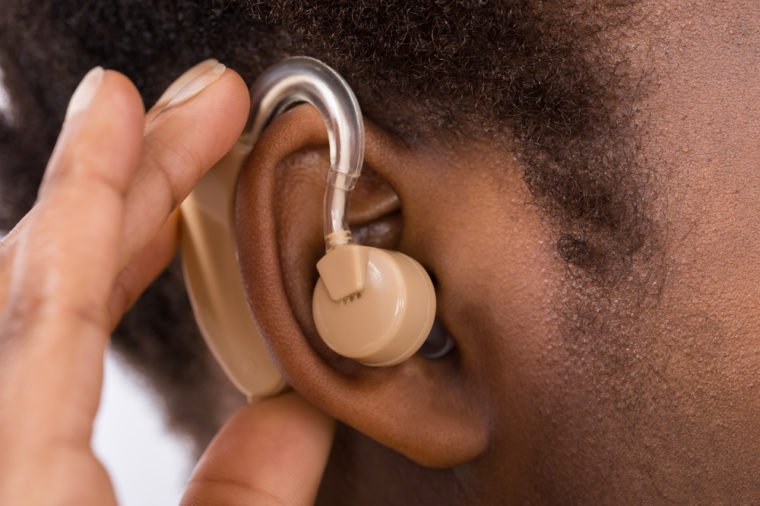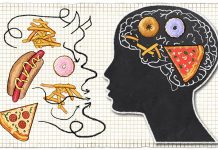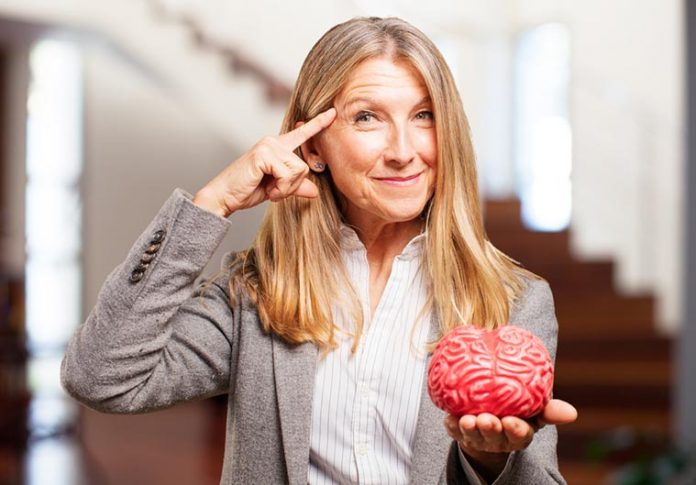From the walk you skipped this morning to the snacks you’ll have before bedtime, your daily choices may have a big impact on your risk of developing dementia and Alzheimer’s disease. Here are the top ways you’re speeding the decline of your mind.
You’re not taking steps to save your mind

There’s no getting around the fact that normal aging brings brain changes that slow cognitive function: Some brain regions shrink, communication between neurons may decrease, blood flow in the brain may lessen, and inflammation could increase, says the National Institute on Aging (NIA). But certain daily habits may accelerate this brain aging—and there is something you can do about that. While researchers haven’t confirmed a specific “prescription” for ideal cognitive health, says Marie A. Bernard, MD, deputy director of the NIA, a growing body of research—including a 2017 report from the National Academies of Sciences, Engineering, and Medicine—suggests practices that are healthy in general may also be beneficial for cognition. “In other words, physical activity, managing the risk factors for cardiovascular disease (i.e., high blood pressure, diabetes, smoking), getting sufficient sleep, are all good for other health reasons and may be helpful for the brain,” Dr. Bernard said in an email. “Additional practices such as staying socially active, treating depression, and avoiding excessive alcohol consumption may also be beneficial.” Don’t miss the 12 signs your brain is aging faster than you are.
You’re not protecting your hearing

Hearing loss is linked to dementia: A 2011 study by Johns Hopkins University School of Medicine and the National Institute on Aging found that senior citizens with hearing loss were “significantly more likely to develop dementia.” It’s possible that the strain of struggling to hear could overburden the brain or that hearing loss could lead to social isolation, which is an acknowledged risk factor for dementia. Whatever the reason, study volunteers with mild, moderate, and severe hearing loss exhibited a twofold, threefold, and fivefold—respectively—increase in the risk of developing dementia over a period of years.
You drink too much

As far as your brain is concerned, there’s a big difference between enjoying a glass of wine with dinner and bingeing on a Saturday night. A 2012 study from Rutgers University used rats to model “moderate to heavy drinking” defined as a blood alcohol level of 0.08 percent. In these “drunk” rodents, the production of nerve cells in the brain’s hippocampus—the region involved in certain types of learning—dropped by almost 40 percent. “In the long term this type of behavior could have an adverse effect on learning and memory,” graduate student and lead author Megan Anderson said in a Rutgers press release. Make sure you keep your brain young with these genius habits.
You’re not caring for your heart

Common sense says heart health is directly connected to brain health. “We know what’s good for your heart is good for your brain,” says James A. Hendrix, PhD, director of Global Science Initiatives at the Alzheimer’s Association. “If your heart is stressed and strained and your brain is not getting proper blood flow, it’s going to age more rapidly.” Indeed, a 2017 study in JAMA Neurology contributed to the body of research reaffirming this link. It found that middle-aged individuals with vascular risk factors—like hypertension or diabetes—were more likely to develop dementia as they got older.
You don’t wear a helmet while cycling or skiing

New research is finding that the severity of a traumatic brain injury (TBI) and the age at which it’s sustained can impact dementia risk down the road. A 2018 study in The Lancet Psychology found that people with a history of TBI had a 24 percent greater dementia risk than people without that history. “What surprised us was that even a single mild TBI was associated with a significantly higher risk of dementia,” lead author Jesse Fann, professor of psychiatry and behavioral sciences at the University of Washington School of Medicine, said in a press release. The study also found that if you sustain a brain injury in your 20’s, your risk of having dementia in your 50s jumps by about 60 percent. Fann hoped the study would prompt people with a history of TBI to adopt brain-health habits, such as getting more exercise and using less tobacco and alcohol.
You prefer the couch to the gym

Hendrix warns against letting concerns about certain sports lead to a sedentary lifestyle, because lack of exercise is another risk factor for dementia. In a 2018 study in the journal Neurology, for example, researchers tested women’s fitness by studying their performance on stationary bikes; women with “high cardiovascular fitness” had a dementia risk that was 88 percent lower than a “moderately fit” group of women, CNN reported. In addition, the study found that dementia symptoms began 11 years later in the “high fitness” group over the “medium fitness” group. Avoid these other 22 habits that are making you age faster.
You veg out in front of the TV

When it comes to saving your brain, your mental muscle could benefit from regular workouts, as well. A 2017 study in Alzheimer’s & Dementia Translational Research & Clinical Interventions reported that older adults who had undergone a computer-based cognitive training program called “speed of processing” reduced their risk of dementia by 29 percent. “There is some promising research that has shown that cognitive training in specific realms—for example, processing information or memory—slows down cognitive decline for at least a couple of years after the training,” says Dr. Bernard. “However, it is not clear how this translates into currently available brain games. Importantly, there is not sufficient evidence that brain games can prevent cognitive decline or conditions like Alzheimer’s disease.” Still, challenging your mind—such as reading and doing crossword or Sudoku puzzles—couldn’t hurt and might, in fact, help.
You don’t like learning new things

It turns out people with higher levels of education have lower rates of dementia. “One of the best predictors of who is protected against Alzheimer’s disease and dementia as they age is how much education they have,” says Dr. Hendrix. “As you learn things you develop new connections and this gives you more resilience. It’s like you’ve put more money in your retirement account, and as you retire and your brain starts to slow down you can draw on that.” This deceptively simple measure of strength and flexibility can predict if you will have a long life.
You put off taking steps to protect your mind

Between high school sports and educational choices, young people have plenty of opportunities to protect themselves against dementia decades later. “Brain health is a life course,” Dr. Hendrix says. “It’s not something to think about only because you just turned 65 and you’re retiring. That’s why we need to support education, so our children and grandchildren are set up with that resilience so when they become seniors their brains are better protected.”
You let old friendships and family connections slide away

Just like shopping for shoes or jogging around the neighborhood, keeping your mind sharp and engaged is easier when you involve friends. A 2011 study in the Journal of the International Neuropsychological Society assigned senior citizens a score based on their level of social activity—from visiting family members to attending sporting events. The researchers found that each one-point increase in their social activity score corresponded to a 47 percent decrease in their rate of cognitive decline, Time reported. “Socializing relieves stress, and there’s a huge connection between stress and problems with the brain as we get older,” postdoctoral fellow at the Rush Alzheimer’s Disease Center in Chicago and lead study author Bryan James, said in the magazine.
You don’t practice relaxing

The toll stress takes on the brain is frightening: A 2014 study in the American Journal of Geriatric Psychiatry reported that among people already diagnosed with mild cognitive impairment (MCI), those also experiencing anxiety had a higher risk of quicker cognitive decline. In fact, the chance of developing Alzheimer’s disease increased by 33 percent among people with mild anxiety, by 78 percent for people with moderate anxiety, and by 135 percent for people with severe anxiety. “Our findings suggest that clinicians should routinely screen for anxiety in people who have memory problems because anxiety signals that these people are at greater risk for developing Alzheimer’s,” Linda Mah, an assistant professor at the University of Toronto and principal study investigator said in a press release. This is why you’ll age better than your parents.
You regularly sleep less than seven hours a night

If you’re an older adult, the less sleep you get, the faster your brain ages. Using brain scans, neuropsychological assessments, and records of sleep duration, a 2014 study from Duke-NUS Graduate Medical School Singapore found that “those who slept fewer hours showed evidence of faster ventricle enlargement and a decline in cognitive performance,” according to a Duke-NUS Medical School press release. “Work done elsewhere suggests that seven hours a day for adults seems to be the sweet spot for optimal performance on computer-based cognitive tests,” lead author and Duke-NUS Research Fellow June Lo, PhD, said in the release.
You eat crummy food

As far as your brain is concerned, you definitely are what you eat. A 2015 paper in Alzheimer’s & Dementia: The Journal of the Alzheimer’s Association found that the MIND diet reduced the risk of developing Alzheimer’s disease by as much as 53 percent in people who followed the diet “rigorously,” and by approximately 35 percent in people who adhered to it “moderately well.” The MIND diet calls for eating at least three servings of salad and another vegetable every day, and it promotes these 10 foods for brain health: Green leafy vegetables, other vegetables, nuts, berries, beans, fish, poultry, healthy fats like olive oil, and wine (in moderation). And one of those foods deserves a special shout-out: “Blueberries are one of the more potent foods in terms of protecting the brain,” Martha Clare Morris, PhD, the Rush University nutritional epidemiologist who developed the diet with her colleagues said in a press release.
You smoke

If you want to do everything possible to prevent Alzheimer’s disease, put out the cigarettes for good. A 2010 analysis by University of California San Francisco researchers found that among studies without tobacco industry affiliation, smoking nearly doubled the risk of developing Alzheimer’s disease. Interestingly, studies that did have tobacco industry affiliations put the risk factor at less than one.
You live near a major highway

Highways cause high levels of pollution, which research says can be bad news for our brains. A 2015 study in the journal Stroke looked at people who lived near major roadways and concluded that exposure to the “fine particulate matter” in air pollution is cause for significant concern. “Higher long-term exposures to ambient air pollution are associated with structural changes in the brain that could precede cognitive impairment and overt cerebrovascular damage,” researchers wrote. Now, get out there and start doing these healthy habits that will keep your mind sharp.
Source: RD



















































